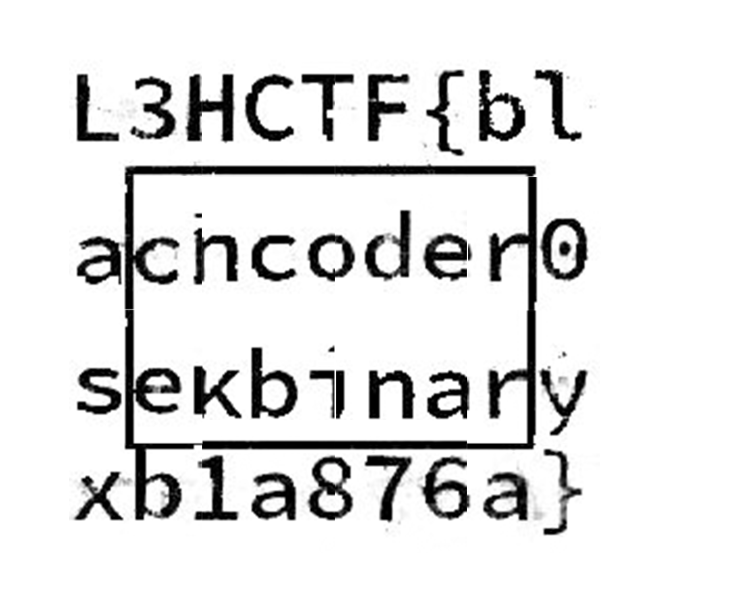L3HCTF 2021 Deepdarkfantasy
大约 3 分钟
DeepDarkFantasy
先放到python里想查看.pth文件网络结构,但打不开 根据提示: Simple XOR | 1. print 2. Bottleneck 3. input tensor == output tensor
文件应该是经过xor加密,
exp1:解密获得decrypted.pth文件
import binascii
data = b''
with open('encrypted.pth', 'rb') as f:
data = f.read()
#每位异0xde后保存
for i in range(256):
print(binascii.hexlify(data[:2]).decode('utf-8'))
if data[0]^i==0x50 and data[1]^i==0x4B:
print('key:', hex(i))
data = bytes([j ^ i for j in data])
# 判断文件头十六进制是否为50 4B
with open('decrypted.pth', 'wb') as f:
f.write(data)
break
第一个坑:文件名是model.py,否则会报错: ModuleNotFoundError: No module named 'model'
因此修改python文件名叫model.py 接下来就是通过加载网络文件,根据报错,不断添加缺少的网络结构,直到可以跑通
RuntimeError:Error(s) in loading state_dict for MyAutoEncoder: Unexpected key(s) in state_dict:"model","state_dict",提示我们存在俩多出来的键,自然想到去看一看state_dict和model中的内容,这时我们利用pycharm的debug功能单步运行,在load_state_dict函数打一个断点
这样我们就利用pytorch自带的解析器得到了整个网络的结构和所有参数,然后我们使用控制台将这些信息dump出来看一看细节
我们根据其网络结构构建需要的Autoencoder,并从题目给的解密后的文件中读取参数
出题人把一张含有flag的图片分成很多份,之后padding后送入Autoencoder进行训练,这样使得解码器具有在给定特定特征的情况下生成出flag残片的功能,因此我们可以控制d的值来控制输出
可以看出生成的图片明显分成有分界线,尝试后找到输入tensor形状为[1,1,1,1]时恰好能生成一块残片,编写代码遍历d
exp2:
import torch
from torch.nn import *
from torchvision import transforms
class Encoder(Module):
def __init__(self):
super().__init__()
self.conv = Sequential(
Conv2d(1, 16, kernel_size=(3, 3), stride=(2, 2), padding=(1, 1)),
ReLU(),
MaxPool2d(kernel_size=2, stride=2, padding=0, dilation=1, ceil_mode=False),
Conv2d(16, 8, kernel_size=(3, 3), stride=(2, 2), padding=(1, 1)),
MaxPool2d(kernel_size=2, stride=2, padding=0, dilation=1, ceil_mode=False),
ReLU(),
Conv2d(8, 8, kernel_size=(3, 3), stride=(2, 2), padding=(1, 1)),
MaxPool2d(kernel_size=2, stride=2, padding=1, dilation=1, ceil_mode=False),
ReLU(),
MaxPool2d(kernel_size=2, stride=2, padding=0, dilation=1, ceil_mode=False),
Flatten(start_dim=1, end_dim=-1)
)
self.fc=Linear(in_features=32, out_features=16, bias=True)
def forward(self, x):
x=self.conv(x)
x=self.fc(x)
return x
class Decoder(Module):
def __init__(self):
super().__init__()
self.convt=Sequential(
ConvTranspose2d(1, 256, kernel_size=(1, 1), stride=(1, 1)),
ReLU(),
ConvTranspose2d(256, 256, kernel_size=(1, 1), stride=(1, 1)),
ReLU(),
ConvTranspose2d(256, 512, kernel_size=(1, 1), stride=(1, 1)),
ReLU(),
ConvTranspose2d(512, 128, kernel_size=(4, 4), stride=(4, 4)),
ReLU(),
ConvTranspose2d(128, 64, kernel_size=(4, 4), stride=(4, 4)),
ReLU(),
ConvTranspose2d(64, 32, kernel_size=(2, 2), stride=(2, 2)),
ReLU(),
ConvTranspose2d(32, 1, kernel_size=(2, 2), stride=(2, 2)),
Sigmoid()
)
def forward(self, x):
x = self.convt(x)
return x
class MyAutoEncoder(Module):
def __init__(self):
super().__init__()
self.encoder=Encoder()
self.decoder=Decoder()
def forward(self, x):
#x=self.encoder.forward(x)
x=self.decoder.forward(x)
return x
path='decrypted.pth'
mymodel=MyAutoEncoder()
mymodel.load_state_dict(torch.load(path,map_location=torch.device('cpu'))['state_dict'])
# 遍历d
mymodel.eval()
num=-40.0
for i in range(7000):
mylist=[[[[num+0.01*i]]]]
# print(mylist)
data=torch.FloatTensor(mylist)
pics = mymodel.forward(data)[0]
toPIL = transforms.ToPILImage()
pic = toPIL(pics[0])
pic.save('./pic/random'+str(i)+'.jpg')
得到pic,挑选出符合flag
通过ps软件拼接

得到flag
L3HCTF{blacncoder0sekbinaryxb1a876a}
